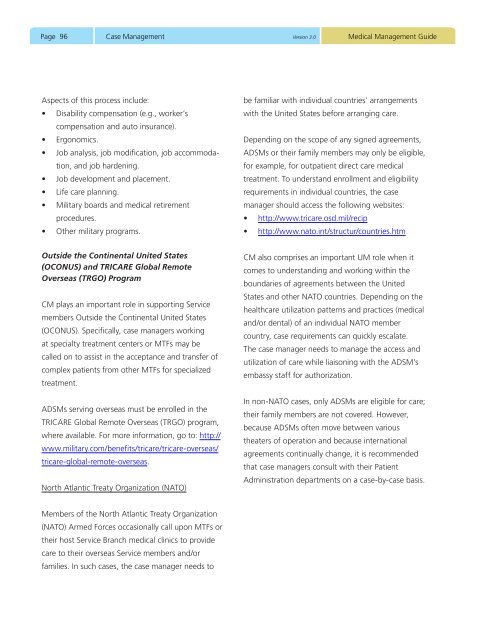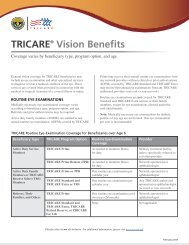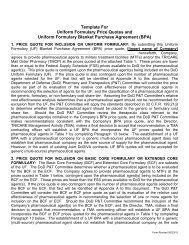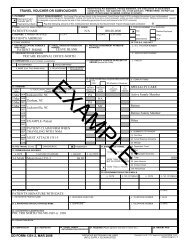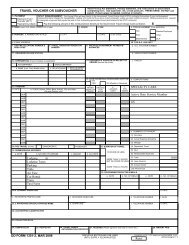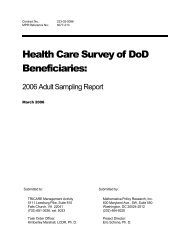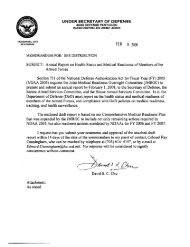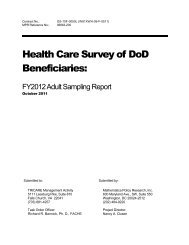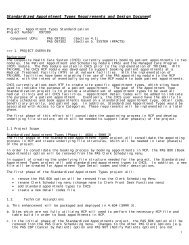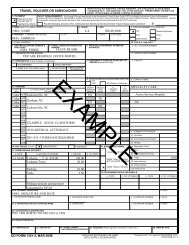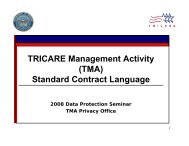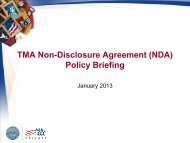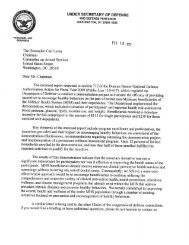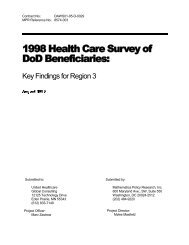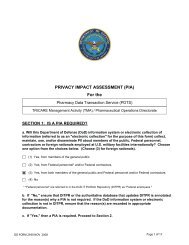Medical Management Guide, 2009, Version 3.0 - Tricare
Medical Management Guide, 2009, Version 3.0 - Tricare
Medical Management Guide, 2009, Version 3.0 - Tricare
- No tags were found...
You also want an ePaper? Increase the reach of your titles
YUMPU automatically turns print PDFs into web optimized ePapers that Google loves.
Page 96Case <strong>Management</strong> <strong>Version</strong> <strong>3.0</strong><strong>Medical</strong> <strong>Management</strong> <strong>Guide</strong>Aspects of this process include:• Disability compensation (e.g., worker’scompensation and auto insurance).• Ergonomics.• Job analysis, job modification, job accommodation,and job hardening.• Job development and placement.• Life care planning.• Military boards and medical retirementprocedures.• Other military programs.be familiar with individual countries’ arrangementswith the United States before arranging care.Depending on the scope of any signed agreements,ADSMs or their family members may only be eligible,for example, for outpatient direct care medicaltreatment. To understand enrollment and eligibilityrequirements in individual countries, the casemanager should access the following websites:• http://www.tricare.osd.mil/recip• http://www.nato.int/structur/countries.htmOutside the Continental United States(OCONUS) and TRICARE Global RemoteOverseas (TRGO) ProgramCM plays an important role in supporting Servicemembers Outside the Continental United States(OCONUS). Specifically, case managers workingat specialty treatment centers or MTFs may becalled on to assist in the acceptance and transfer ofcomplex patients from other MTFs for specializedtreatment.ADSMs serving overseas must be enrolled in theTRICARE Global Remote Overseas (TRGO) program,where available. For more information, go to: http://www.military.com/benefits/tricare/tricare-overseas/tricare-global-remote-overseas.North Atlantic Treaty Organization (NATO)CM also comprises an important UM role when itcomes to understanding and working within theboundaries of agreements between the UnitedStates and other NATO countries. Depending on thehealthcare utilization patterns and practices (medicaland/or dental) of an individual NATO membercountry, case requirements can quickly escalate.The case manager needs to manage the access andutilization of care while liaisoning with the ADSM’sembassy staff for authorization.In non-NATO cases, only ADSMs are eligible for care;their family members are not covered. However,because ADSMs often move between varioustheaters of operation and because internationalagreements continually change, it is recommendedthat case managers consult with their PatientAdministration departments on a case-by-case basis.Members of the North Atlantic Treaty Organization(NATO) Armed Forces occasionally call upon MTFs ortheir host Service Branch medical clinics to providecare to their overseas Service members and/orfamilies. In such cases, the case manager needs to


